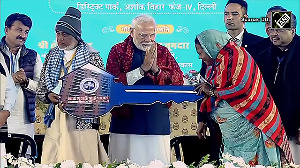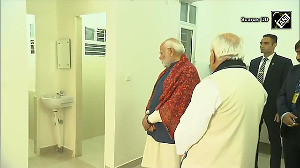The Supreme Court laments that they spend most of their time in covering their back rather than in achieving their goals, writes M J Antony.
 Public sector undertakings are often portrayed as sluggish mammoths hogging undeserved patronage of the state.
Public sector undertakings are often portrayed as sluggish mammoths hogging undeserved patronage of the state.
When many of them are being dismantled or downsized, there are very few words spoken in sympathy with their plight.
Therefore, when some kind words come from unexpected quarters, one is bound to listen carefully.
It was the Supreme Court itself that wrote a few pages on this subject in its recent judgment in the BSNL vs Telephone Cables Ltd case.
The case related to one of the disputes over the tender process adopted by PSU Bharat Sanchar Nigam Ltd.
These days, if a government company floats a tender, litigation cannot be far behind.
They travel from the regulatory authority, its appellate authority, the high court and then the Supreme Court.
Whether it is electricity, oil, spectrum, mining lease or any of the resources held in trust by the state, it is fiercely fought over at every stage.
The Supreme Court made its remarks in a case involving the tender procedure for inviting bids for polythene-insulated cables.
The dispute travelled three times to the Supreme Court in nine years and there was one attempt at arbitration.
The Delhi high court found that the procedure was not followed. It asked BSNL to redo the ratings for the competing bidders.
It even allowed the private company to sue for compensation. This led to another round of litigation.
When the company found the going was not smooth, it called for arbitration. The Supreme Court cut the long story short by denying arbitration.
It is the BSNL's predicament during this long period which aroused the sympathy of the court.
It pointed out the 'vulnerable position' most PSUs find themselves in such situations. It said: "More and more, they are subjected to vexatious litigation and other travails which other competitors in the private sector do not normally face.
When public undertakings used to have monopoly and discharged public duties, control by the government and legislature and judicial review by the judiciary were an absolute necessity to safeguard public interest and ensure transparency and accountability.
But when public undertakings are required to compete with private sector, in commercial areas, controls by the executive and the legislature (sometimes referred to as political bondage) and judicial review of their action became a handicap which impedes their progress."
PSUs' agony flows from their position in the Constitution. They are taken to be 'state' with all its obligations.
According to the court's interpretation, the state or its arms should be free from arbitrariness and discrimination and ensure fairness in all its deals.
Private companies are not legally bound to be so immaculate.
The judgment explained this aspect thus: "A public undertaking is required to ensure fairness, non-discrimination and non-arbitrariness in their dealings and decision-making process.
"Their action is open to judicial review and scrutiny under the Right to Information Act. They are required to take out advertisements and undergo elaborate and time-consuming selection processes, whether it is purchase of materials or engaging of contractors or making appointments.
"Just to ensure that everyone is given a fair and equal opportunity, public undertakings are required to spend huge amounts and enormous time in elaborate tender processes."
Giving an example, the court pointed out that a proposal for the purchase of the value of Rs 10 lakh (Rs 1 million) may involve a 'material procurement expenditure' of Rs 200,000 in advertisements and tender evaluation cost, and a total tender process period ranging from three to six months.
A competing private undertaking can go straight into the market and negotiate directly and get the same material for Rs 500,000 without any expenditure in a week.
"Public undertakings, to avoid being accused of mala fides, bias or arbitrariness, spend most of their time and energy in covering their back rather than in achieving development and progress," the judgment commented, and pointed out that 'when courts grant stay, the entire projects or business ventures stand still or get delayed.'
Even if ultimately the stay is vacated and the complaint is rejected as false, the damage is done as there is enormous loss to the public sector undertakings in terms of time and increase in costs.
The private sector is not open to such scrutiny by courts.
When the public sector is tied own by litigation and controls, the private sector quietly steals a march, many a time at the cost of the public sector.
The court clarified that it was not advocating less of judicial review.
"We are only pointing out that if the public sector has to survive and thrive, they should be provided a level playing field. How and when and by whom is the question for which answers have to be found."







 © 2025 Rediff.com -
© 2025 Rediff.com -